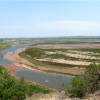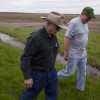Background
When Did Rice Farming Begin in Texas?
Rice farming in Texas can trace it origins to 1685, when rice first came to the US from Madagascar, according to the Texas State Historical Association. “Although there was early domestic cultivation of rice in Louisiana and Texas,” they write on their website, “commercial rice production began in Louisiana shortly before the Civil War and in the 1880s spread rapidly through the coastal prairies of southwest Louisiana into southeast Texas.”
According to the Lower Colorado River Authority (LCRA), which manages the river that provides water to the farmers, “coastal rice farmers began using the waters of the Colorado River in the 19th century, more than 40 years before the Highland Lakes were created.” More from the LCRA:
“Texas usually ranks as the nation’s fourth or fifth highest producing rice-growing state, producing about 7 percent of the nation’s supply. Most Texas rice is grown near the Colorado River in Colorado, Wharton and Matagorda counties. Texas rice farmers count on this water to irrigate land along the Gulf Coast. In addition to rice farmers, customers include a significant number of row-crop farmers, turf grass growers, industries and commercial operations.”
Why Do Rice Farmers Get the Water?
The LCRA has outlined two reasons why they are responsible to the rice farmers:
- “Texas law declares that the state must give preference to certain types of water uses when granting water rights. LCRA’s practice of giving preference to downstream rice farmers when distributing interruptible stored water — a water supply that is curtailed during water shortages — is consistent with the Texas Legislature’s directive. The contracts for this water are negotiated during development of the LCRA Water Management Plan, which is subject to state approval.”
- “According to state water law, first in time is first in right. Downstream rice farmers were given first water rights in the Colorado basin, and these rights are senior to LCRA’s water rights for the Highland Lakes. In fact, without the support of the rice farmers, the Highland Lakes and dams might never have been built. Rice farmers were among the strongest supporters of building the Highland Lakes and dams in the 1930s. They recognized the value of the dams in easing flooding and making water available during droughts.”
Water Wars
In recent years, the LCRA has been in the middle of a water dispute between the rice farmers and communities near the Highland Lakes. The LCRA has since proposed a new water management plan that will change how much water goes from the Highland Lakes to customers downstream. In essence, the plan means more water for the lakes and less for the farmers. On February 22, 2012, the LCRA voted in favor of the plan with ten in favor and five against. It is now going to the Texas Commission on Environmental Quality (TCEQ) for approval.
Water Cut Off in 2012
Texas rice farmers that rely on the Lower Colorado were mostly cut off from its water in 2012. Under an emergency water plan adopted by the LCRA in late September in response to the drought, the combined storage of Lakes Buchanan and Travis had to be at 850,000 acre-feet by midnight on the night of March 1st in order for water to be sent downstream. It fell just short of that, and therefore most of the rice farmers in Southeast Texas went without a crop in 2012. Insurance will cover their losses, but many ancillary industries have suffered.
Looming Shortages in 2013
The latest recommendation by the Lower Colorado River Authority is to adopt another emergency drought plan for 2013 that would result in less water for rice farmers than under a normal plan. That will come up for discussion at a meeting of the agency’s board in mid-November.







